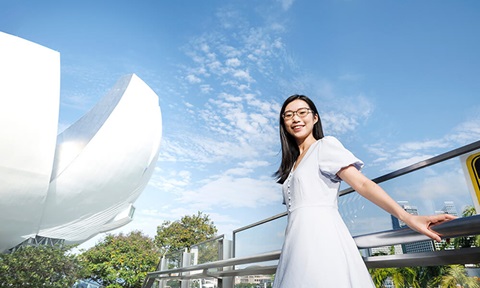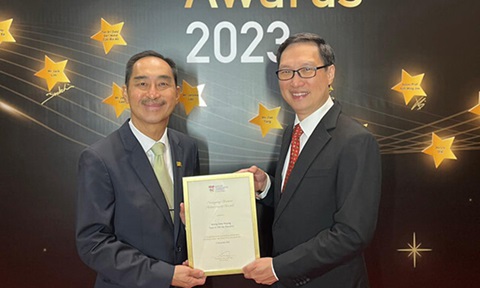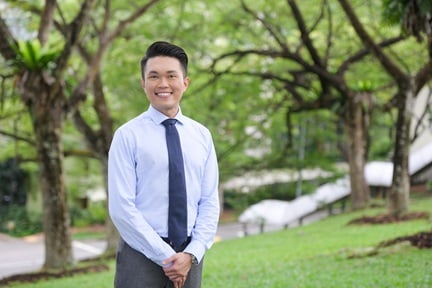Up Close With Professor Leo Tan: The Man Behind The Vision
In an exclusive interview with NIEWS, Professor Leo Tan, the visionary behind the Caring Teacher Awards, shares captivating stories that offer a rare glimpse into his tenure as a former NIE Director.
We caught up with Professor Leo Tan on a busy day. He was at the NIE as part of the judging panel for the Caring Teacher Awards (CTA). Between hungry gulps of coffee, we tried to learn as much as we could about our distinguished interviewee. For one, he had conceived the CTA in 1996 to uplift teachers who went above and beyond for their students’ welfare. We also learned that he’s not really retired. “I’m now ‘re-tyred’ for other things,” he said, spelling the word for emphasis.
As Singapore’s first locally trained marine biologist, Professor Tan had a lot on his shoulders back in the day, including spearheading Singapore’s biodiversity initiatives and advocating for our natural environment. Over a 50-year career dedicated to science, education and the environment, he revitalised the Singapore Science Centre as its Director, championed nature conservation as Chairman of the National Parks Board, and established the multidisciplinary Bachelor of Environmental Studies programme — all of which, a mere scratch in his vast array of accomplishments.
As NIE Director from 1994 to 2006, he pushed for the Centre for Research in Pedagogy and Practice (CRPP), an unprecedented move at the time as research funding was typically prioritised for academic subjects. As his anecdotes emerged, it was clear that his effective leadership was linked to his ability to secure people’s buy-in.
He recounted one episode, which took place shortly after the NIE’s relocation to NTU. “Back in Bukit Timah, the NIE students adhered to a certain dress code as salaried trainee teachers. But upon arriving at NTU, they quickly adopted the t-shirt-and-shorts attire, akin to the other NTU students. This drew criticism from the schools, as the NIE students would sometimes show up for teaching duties in attire that was deemed too casual.”
He remembers discussing the matter with the Trainee Teachers Club. “The student committee suggested a fashion show showcasing suitable teaching attire. The event was a huge success. Empowering the students really paid off in gaining their support. Had we simply imposed the dress code, I would’ve had a student revolt on my hands!” he joked.
“It’s the same principle behind the CTA: Put people first. If we view education solely as a profession, it risks becoming technical, transactional and impassive,” he mused. “In the past, teaching wasn’t seen as a prestigious job. We even had to fight for internship opportunities for student teachers. Initiatives like the CTA are vital, because values and recognition are important. Without these elements, we’re merely selling a profession, and education is much more than that. It’s about nurturing future generations. These days, I’m delighted to see our students participating and gaining exposure through practicums and overseas exchanges,” said Professor Tan.
He recalls another instance where the art of persuasion proved invaluable. Facing dissent over a task to transform the NIE’s organisational structure, he reflected: “To manage mindset change, never use force.” Instead, Professor Tan sent the dissenters out to collect feedback, promising to reconsider their stance if they returned with evidence that a new organisational structure would not work. “It was risky, but we won them over, and as they say, the rest is history!” he laughed.
“Even as a marine biologist, I’d often have to persuade other experts, like physicists, mathematicians, economists and businessmen, to help with environmental challenges. There’s a natural tendency for people to operate in silos, which can lead to them being blindsided. To truly champion knowledge creation, we must be prepared to change our own mindset and learn to collaborate,” he said, echoing our theme for this issue of NIEWS.
Professor Tan believes that promoting a culture of inquiry and championing knowledge creation are imperative for navigating the future. “The world is complex, and addressing its challenges would require more than just transferring knowledge between extrinsic and intrinsic learning. We’d also have to work with those who bring different perspectives to the table,” he said.
While the buy-in effort is necessary, the professor agrees that unanimous consensus is ultimately elusive. “What matters is to stick to the values and principles that are fair and just.” Going by Professor Tan’s track record of leadership and accomplishments, it’s certainly an approach that has consistently yielded effective outcomes.
Read the original article here.














/enri-thumbnails/careeropportunities1f0caf1c-a12d-479c-be7c-3c04e085c617.tmb-mega-menu.jpg?Culture=en&sfvrsn=d7261e3b_1)

/cradle-thumbnails/research-capabilities1516d0ba63aa44f0b4ee77a8c05263b2.tmb-mega-menu.jpg?Culture=en&sfvrsn=1bc94f8_1)

7e6fdc03-9018-4d08-9a98-8a21acbc37ba.tmb-mega-menu.jpg?Culture=en&sfvrsn=7deaf618_1)





.tmb-listing.jpg?Culture=en&sfvrsn=c9334315_1)
